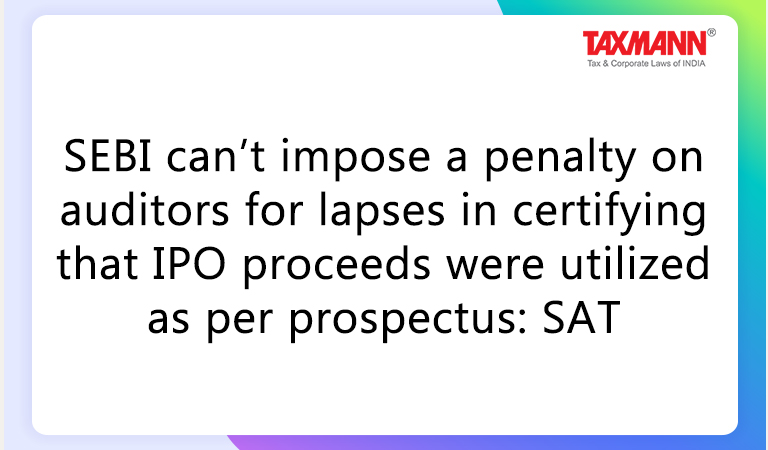SEBI can’t impose a penalty on auditors for lapses in certifying that IPO proceeds were utilized as per prospectus: SAT
- Blog|News|Company Law|
- 3 Min Read
- By Taxmann
- |
- Last Updated on 30 June, 2022

Case Details:M.V. Damania & Co. v. Securities and Exchange Board of India - [2022] 134 taxmann.com 257 (SAT - Mumbai)[17-01-2022]
Judiciary and Counsel Details
-
- Tarun Agarwala, Presiding Officer and M.T. Joshi, Judicial Member
- Ravichandra Hegde and Robin Shah, Advs. for the Appellant.
- Vishal Kanade, Ms. Nidhi Singh, Ms. Deepti Mohan and Ms. Binjal Samani, Advs. for the Respondent.
Facts of the Case
In the instant case, M/s M.V. Damania & Co. (Hereinafter referred to as “Appellant 1”) and Mr. Bharat Jain (Hereinafter referred as “Appellant 2”), jointly referred to as “Appellants “filed an appeal before the Securities Appellate Tribunal (SAT) against the order of Securities and Exchange Board of India (SEBI), (Hereinafter referred as “Respondent”) who imposed a joint and several penalties of Rs. 15 lakhs on the appellants.
Appellant no. 1 was a statutory auditor while appellant no. 2 was its partner who had certified the impugned statutory audit regarding the appropriation of Initial Public Offering (IPO) of Paramount Printpackaging Ltd.
In the instant case, a show-cause notice alleged that the company, whose accounts were audited did not utilize the IPO proceeds and that it was diverted to different entities in the guise of making payments towards the objects stated in the prospectus. The focus in the show cause notice was to examine the role of the appellant as the statutory auditor with regard to the due diligence done by it by certifying the expenditure incurred by the company towards the IPO expenses out of the IPO proceeds.
The appellants certified the amount was utilized as per the prospectus. The A.O. however found that there were lapses on the part of the appellant and due diligence was not carried out by them while certifying that the IPO proceeds were utilized for the objects stated in the prospectus.
The appellants submitted that they carried out an audit of the financial statements of the Company based on the information provided by the management. In the process of the audit, the appellant endeavoured to obtain audit evidence that is sufficient and appropriate to provide a basis for the appellants’ opinion. All the payments made by the Company were supported by bank statements as certified by the Company. It was further contended that the provisions of PFUTP Regulations would not be applicable as no fraud is alleged against the present appellants.
The respondent however did not agree with the submissions. The penalty was imposed for violation of the provisions of Section 12 of SEBI Act, 1992 and Regulations 3 of the SEBI (Prohibition of Fraudulent and Unfair Trade Practices relating to Securities Market) Regulations, 2003 and the impugned order was passed.
Appellants filed an appeal before the Securities Appellate Tribunal (SAT) against the order of the respondent.
SAT Held
SAT ruled out that SEBI cannot impose a penalty on auditors under section 12A(c) of SEBI Act,1992 or under Regulations 3 & 4 of PFUTP Regulations for professional negligence or lack of due diligence or lapses in certifying that IPO proceeds were utilized for objects stated in the prospectus. Proceedings against auditors for professional negligence only, without any finding of fraud or deception or connivance or manipulation by auditors, would fall within the domain of professional misconduct proceedings by ICAI. SEBI can invoke the said provisions and impose a penalty on auditors only if there is a finding that auditors were instrumental in preparing false or manipulated accounts or have connived in the falsification of books of account.
In the Instant case, nothing was proved that the auditors were instrumental in preparing false or manipulated accounts or have connived in the falsification of books of account. Hence, SEBI cannot invoke the said provisions and impose penalties on auditors.
Accordingly, SAT sets aside the penalty imposed by SEBI on auditors for negligently certifying the IPO proceeds.
Disclaimer: The content/information published on the website is only for general information of the user and shall not be construed as legal advice. While the Taxmann has exercised reasonable efforts to ensure the veracity of information/content published, Taxmann shall be under no liability in any manner whatsoever for incorrect information, if any.

Taxmann Publications has a dedicated in-house Research & Editorial Team. This team consists of a team of Chartered Accountants, Company Secretaries, and Lawyers. This team works under the guidance and supervision of editor-in-chief Mr Rakesh Bhargava.
The Research and Editorial Team is responsible for developing reliable and accurate content for the readers. The team follows the six-sigma approach to achieve the benchmark of zero error in its publications and research platforms. The team ensures that the following publication guidelines are thoroughly followed while developing the content:
- The statutory material is obtained only from the authorized and reliable sources
- All the latest developments in the judicial and legislative fields are covered
- Prepare the analytical write-ups on current, controversial, and important issues to help the readers to understand the concept and its implications
- Every content published by Taxmann is complete, accurate and lucid
- All evidence-based statements are supported with proper reference to Section, Circular No., Notification No. or citations
- The golden rules of grammar, style and consistency are thoroughly followed
- Font and size that’s easy to read and remain consistent across all imprint and digital publications are applied



 CA | CS | CMA
CA | CS | CMA
